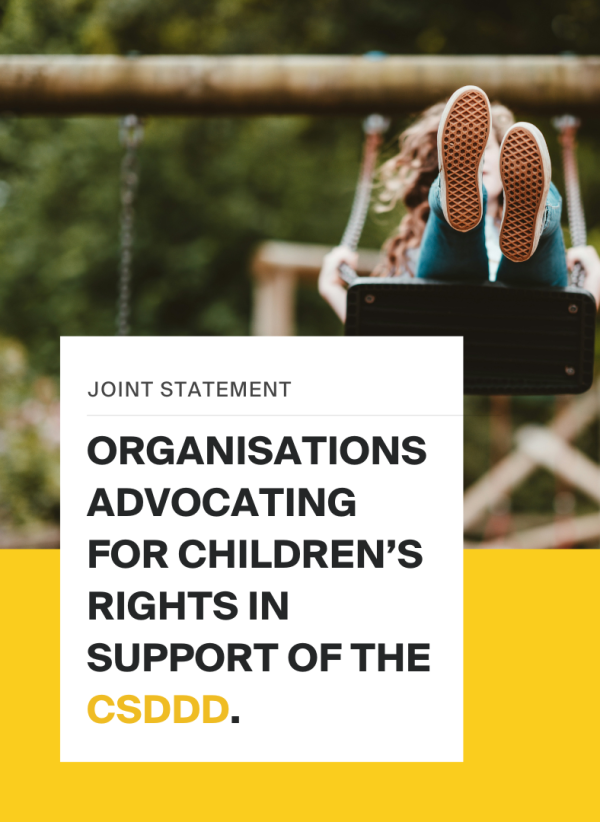This website uses cookies so that we can provide you with the best user experience possible. Cookie information is stored in your browser and performs functions such as recognising you when you return to our website and helping our team to understand which sections of the website you find most interesting and useful.

Brussels, March 15 – Today’s decision by EU capitals to endorse the Belgian Presidency’s political deal on the Corporate Sustainability Due Diligence Directive (CSDDD) is a significant step forward in the protection of human rights and the environment from corporate harm. This political endorsement is a landmark decision in favour of regulating businesses to respect the planet and the rights of those impacted by business operations – including women, workers and indigenous communities, and to provide access to justice for victims.
Yes to the CSDDD, but devastating & deplorable last-minute concessions
Whilst today’s endorsement by the EU Council is an important step in formally adopting the directive, last-minute changes due to political manoeuvres by several Member States and business lobbies have further watered down a political agreement that had already not fully met international standards and expectations. Disappointingly, the CSDDD will now only apply to roughly 0.05% of EU companies and business activities that typically bear risks for the environment and human rights.


After last week’s deadlock among EU capitals, the Belgian Presidency finally succeeded in brokering a compromise among Member States resulting in the political endorsement of the CSDDD. This came with huge and damaging cuts to – what was meant to be the political deal agreed with the parliament last December. The text agreed today by the Council still needs approval from the European Parliament.
Takeaways and key observations from a watered-down version of EU negotiators’ deal
Company scope: even fewer EU companies covered
- Expectation: A robust EU due diligence law that would hold ALL irresponsible companies accountable.
- Reality check: Under the proposal presented to the Council today, we estimate that nearly 70% of companies captured by the political deal of December 2023 would not face accountability for harm to people and the environment. Following last-minute moves by France, companies will have to be over twice the size than originally previously agreed to fall into scope. The proposal was to reduce the personal scope by raising thresholds from 500 employees to over 1,000 on average and from EUR 150 million to EUR 300 million, eventually reaching EUR 450 million in turnover in the current text. Even in sectors that are notoriously tainted by atrocious human rights violations – such as textile, mining and the agricultural sector-, only extremely large companies will have to address human and environmental rights abuses in their value chains. This proposed change is even more scandalous considering the European Commission’s initial proposal would have covered just 1% (1) of all EU companies. We estimate that the changes will decrease the total number of EU companies covered by the CSDDD from roughly 16,000 to under 5,500.
An even shorter chain of corporate activities subject to due diligence
- Expectation: A crosscutting directive that would require companies to identify, prevent, mitigate, respond to, and remediate human rights abuses and environmental damage in their global value chains, throughout the entire upstream and downstream.
- Reality check: To please large Member States such as Italy, the newly brokered deal further cut down on the activities subject to due diligence duties, by excluding product disposal, dismantling and recycling, as well as composting and landfilling. This means that companies will not have to identify and respond to risks and harms in these downstream activities.
Climate transition plans yes, but no rewards for leadership in carbon-neutral implementation
- Expectation: A CSDDD that would require and incentivise large companies to assess climate risks and develop and implement climate impact mitigation strategies can bring the much-needed shift toward carbon neutrality.
- Reality check: Italy and France have been completely opposed to requiring companies to provide financial incentives (meaning bonuses) to their directors to promote the implementation of climate transition plans. This provision would have sought to accelerate the sustainability transition by rewarding directors. While companies will still need to adopt transition plans, it is alarming that, amidst a climate crisis, the EU Council removed this tool for promoting carbon neutrality.
NOTE (1): Source, SOMO with some data from Orbis & Eurostat, calculations are made based on publicly available data and come with attached methodological limitations








